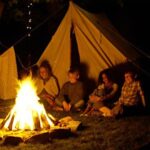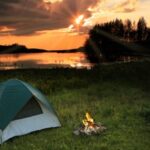by Liz Childers
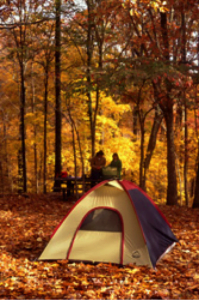
One of the greatest things about going to college on the Cumberland Plateau in Tennessee was a fall that arrived promptly with September and hung around until December. Fall has always been my favorite season, so this was an incredibly welcome change from Alabama’s regular Indian summers to which I was accustomed. Now, I’m living in New Orleans and, as I got off the plane yesterday from a weekend spent in 60-degree weather on a farm in North Carolina, I had a twinge of regret for leaving the mountains. I’m making myself feel better with the reassurance that I’ll have autumnal temperatures for most of winter, but I’ve also been thinking of ways to pretend its fall. If you are actually enjoying fall weather somewhere, then you may want to join me in one of my diversions: getting my camping gear ready cooler temperatures.
The fall is one of my favorite times to camp. Not only do many parks offer discounted reservations fees after Labor Day, but its just more exciting to be outdoors when the air turns crisp. Here’s the short checklist I run through each year to make sure I’m ready. Do you enjoy camping in the fall, too? What do you do to prepare yourself for cool weather camping?
Prepare the sleeping bag for colder weather
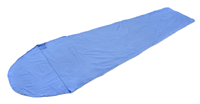
My sleeping bag is not meant to keep me warm in super cold temperatures. I’m not actually sure where it would rank on the EN standard, but I feel comfortable telling you that it belongs in warm climates. The easiest way to ruin a camping trip is to be too cold to sleep, so it’s essential that I know I can stay warm if the temperature drops while I’m in the woods. Personally, knowing my sleeping bag liner is in good condition and ready to pack is the best assurance. My liner comes in its own stuff sack, so it’s easy to carry in my pack. Then, I can slip in my bag for added warmth or keep it in the bottom of my bag – whatever the varying fall weather dictates.
Make sure my wool socks and boots are in trail-worthy condition
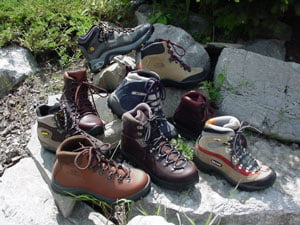
In the summer, Chacos or my running shoes are fine for hiking and camping, but I always switch to hiking boots in the fall. Even if it isn’t cold out when I leave the house, it will probably be chilly by the time the sun sets. The waterproof protection of boots means a random rainstorm won’t leave me with freezing cold feet once the evening chill hits. On this same note, I always check to make sure I have a few pairs of good, wool socks ready to pack. Socks are great to wear while sleeping, and more changes of socks than necessary is necessary in the case of rain.
See if I have enough animal-proof food containers
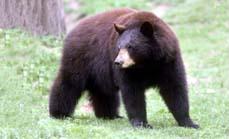
Normally, I fully support the food storage method of tying a tarp around the food and hoisting it above a tree branch far removed from the campground. However, in the fall, animals start storing for hibernation; this raises the risk of a bear rummaging through the campground in search of food. So starting in the fall, I tend to pack my food in bear-safe, airtight containers and then tie them in a tarp far away from my tent. These help prevent any odor that could attract animals.
Add cold weather supplies to my first aid kit
A
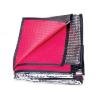
Of course most of the contents of my first aid kit stay the same year-round. Every fall, though, I add a few cold weather items. These include a thermal blanket and hand and foot warmers. Even if it’s not very cold, I never know what could happen on a camping trip in the fall and winter or when temperatures could plummet for a few nights. That’s why I never venture into the woods in cool weather without these additional first aid supplies.

